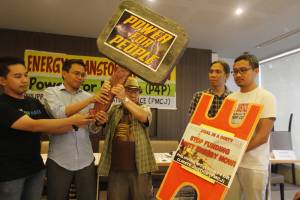
On the occasion of the global observance of Earth Day, climate justice groups, nongovernment organizations and grassroots people’s movement launched today a year-long campaign that would intensify the push for REnergy Transformation or the shift from carbon and fossil-intensive energy systems to renewable system for peoples and communities. Photo by: AC Dimatatac
Earth Day was born in 1970 in the US, at the peak of an awakening in environmental awareness that led to the Clean Air Act and a flurry of effective legislative responses to an ecological crisis. 45 years on the challenge of our survival as a specie calls us to act with urgency in responding t a crisis of far greater, planetary proportions: climate change.
We stand at the crossroads of convergence among social movements as climate change compels us to look beyond the usual frame of seeing it as a mere environmental issue towards equating it with the universal pursuit for justice, peace, equality and sustainability.
That’s why in our work here in the Philippines we choose to do it in coordination with movements and organizations that are already working on social justice. Because while climate change affects everyone its impacts are not evenly distributed: race, gender, economic status determines how one would be able to cope and survive the impacts of climate change.
Studies around climate change has already arrived at the conclusion that those who contributed least to climate change are the same ones who’ve benefited least from the use of fossil fuels, while at the same time are also the first people to bear its impacts which paints us a classic example of the tragedy of life in an unequal society.
On the occasion of the global observance of Earth Day, climate justice groups, non-government organizations and grassroots people’s movement launched a year-long campaign that would intensify the push for Renewable Energy Transformation or the shift from carbon and fossil-intensive energy systems to renewable system for peoples and communities.
Divesting from destruction
Fossil fuel divestment takes the fossil fuel industry to task for its culpability in the climate crisis. By naming this industry’s singularly destructive influence — and by highlighting the moral dimensions of climate change — we hope that the fossil fuel divestment movement can help break the hold that the fossil fuel industry has on our economy and our governments.
The call for institutions to remove their investment assets including stocks, bonds, and investment funds from companies involved in extracting fossil fuels, in an attempt to reduce climate change, function as strong reminders that institutions are parts and participants of society and are therefore morally obliged to represent the interests of communities and ecosystems. Globally fossil fuel divestment is gaining ground as to date 181 institutions and 656 individuals had committed to divest over $50 billion.
In fact even the UNFCCC — the UN body in charge of global climate change negotiations — has just thrown its support behind our Fossil Free divestment campaign, proving that we are not alone in this struggle.
Let this day be a rallying call: onwards to a fossil free future!
